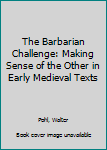The Barbarian Challenge: Making Sense of the Other in Early Medieval Texts
When barbarians took power in the provinces of the Western Roman Empire, the old stereotypes did not suffice to make sense of the situation. Romans faced the migrants with the help of an ancient, if only partly adequate, body of knowledge, but also curious for different explanations. Barbarians had to be distinguished and identified; their success needed to be explained. Christianity provided models for the rule of kings and peoples. Soon, the new rulers appropriated this discourse to legitimate the ethnic identities that helped to integrate their kingdoms. Gradually, the barbarian past became a resource of cultural memory that could be used for various political and social strategies. In this context, many of the texts about barbarians were transmitted. They do not establish a coherent narrative, but they do give access to a fascinating variety of different tales and contradictory interpretations. The studies assembled here explore this variety from different angles. They do not take ethnic identities as a point of departure. Rather, they show how new identifications of political actors and communities established themselves as a result of multiple efforts to make sense of a new and challenging situation.
Format:Hardcover
Language:English
ISBN:2503530206
ISBN13:9782503530208
Release Date:October 2015
Publisher:Brepols Publishers
Length:322 Pages
Weight:0.32 lbs.
Related Subjects
HistoryCustomer Reviews
0 rating





